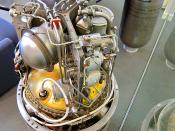Greek myth is comprised of many Gods and Goddesses and the stories of how they came to be and of their life stories. One God that caught my eye was Apollo, the son of Zeus and Leto, was associated with many aspects of life in the time of the Greek gods. He was the God of reason and intelligence, music (the lyre), prophecy, medicine and the sun.Apollo is in many respects the model of a Greek god. He represents order, harmony, and civilization in a way that most other Olympian deities cannot quite equal. One only has to compare him with Dionysus to understand how Apollo is depicted as a bright, rational counterpart to the chaotic and frenzied god of wine and women. Indeed, Apollo is most often associated with the cultivated arts of music and medicine, and his role as the leader of the Muses establishes him as a patron of intellectual pursuits.
Therefore, it comes as no surprise that in art, images of Apollo represented the height of male attractiveness - indeed, for years, statues of youngsters were commonly referred to as "Apollo", later to be replaced by the more accurate term "koros" (young man). However, as with most Greek gods, Apollo has characteristics that are diverse, so we should proceed to an exploration of this important god.
The myth of Apollo's birth includes another instance of the wrath of Hera. Again, the wife of the mighty Zeus discovered that her husband had impregnated yet another goddess, this time Leto. In her anger, Hera would not allow Leto to bear her children (she was pregnant with the twin gods Apollo and Artemis), and the land itself was afraid to provide a shelter for Leto because of the fear of Hera's retribution. Finally,



A few corrections
There were a few mistakes I thought I would point out. First of all, Apollo is not the Greek god of the sun; that is Helios. Apollo is the god of light. This is a very common mistake.
You called Dionysus chaotic and frenzied, but I'm not sure that that is really an accurate portrayal, since Dionysus is always said to be very gentle.
Themis did not give Apollo his bow and arrow, Zeus did.
Niobe had fourteen children, not twelve, and it was not Leto who heard of Niobe's arrogance, but Artemis and Apollo. The two took it upon themselves to kill Niobe's children as punishment. Daphne's father was named Ladon.
You had a lot of good information, but your word choice and sentence structure could use some work.
3 out of 4 people found this comment useful.